I lost my mom when I was 11. It was August, and she had a seizure as a result of her back pain and depression medication. She was brought to the emergency room. Her death was sudden. It wasn’t expected, or part of a terminal illness like most people originally assume when they hear of how young I was. I’ve written about my mother’s death a lot – including this three part series (1, 2, 3) on Janice Beetle’s blog, and my memoir about losing my mom.
But I haven’t written about her in quite some time, and lately, I’ve been inspired to talk about this a little. Recently, I met up with one of my professors, a hilarious woman who, like me, lost a parent at a young age. And something she said about how it “shakes up your worldview” got me thinking about 4 Things That Happen When You Lose a Parent Young. I’m going to sprinkle this list with ways that art and writing projects have helped me to remember my mom and heal after losing her, because it is those projects that give me the strength and happiness that allow me to talk about it without breaking into tears.
1. You try to do everything not to forget what your parent was like. You no longer have the leniency to wait around and hear stories about their childhood, or to ask them how they feel about topical world issues. You keep lists of the things you know about them – like mine about my mom. Her favorite color was purple. She drank Folger’s coffee every morning. She wore sweaters with cats on them.
Inserting these physical details and memories into art and writing can be one way to help you remember the person and feel connected to them. For example, although I don’t wear the kind of cheesy, long-sleeved cat sweaters my mom did, I do implement her love of cats into my fashion – I have a jacket with cat ears on the hood, a pair of cat ears on a headband, and leggings with cats on them. I have also inserted physical details about her into poetry and short stories, which can help if you’re more of a writer than a fashionista.
(A photo of me during a photo shoot, and I am holding up a photo of my mom and her sister as kids.)
2. You’re acutely aware of the moments they have missed, and will continue to miss. My mom died when I was 11. She didn’t get to see my 13th birthday, or my first day of high school. She didn’t get to meet (and harass) my first serious girlfriend, or to tell me what she thought of my dating women. She didn’t see me graduate high school, and she won’t see me graduate college. She’ll miss my wedding, and most of all, she won’t be there to give me advice on how to be a mom when it’s my turn. There’s not a single milestone, or difficult life event, or spectacularly happy moment, when I don’t think of her.
Art and writing help me with these losses, too. I’ve written poetry about missing her on mother’s day. I also plan to decorate my college graduation cap in some way that reflects her, and when my first book is published, I plan to dedicate it to her. These small things give me a way to feel like she’s still watching over me, even though she can’t physically be present for the moment.
3. You start to worry that everyone else will die, too. This was the conversation my professor and I had, that really got me thinking about this. It comes up time and time again – every time my dad doesn’t answer his phone for a while at work, I’m 100% convinced the next call I’ll get is from the police, telling me he’s been in a fatal accident. Losing someone close to you so young does exactly that – it changes your worldview. In my case, the death was an accident. It was something we were totally unprepared for. Sometimes, I feel as though I can prevent myself from feeling so completely shaken by the next death, or perhaps prevent the death itself, simply by being prepared. It always seems that unpleasant things happen when we least expect them to – there’s a fire drill while we’re cozily sleeping, or we miss the bus when we’re in a perfectly good mood. Losing my mom changed me in this way. I’m always preparing for the death of people I love, just in case it happens. A part of me is terrified to be that shaken by something again.
Writing projects are what helps most with this. I write about my fear of losing people, and I even sometimes write out how I would feel if they died. It can help to soothe me and make me realize that no, I’m no longer 11 and if someone close to me passes away, I have a better support system to get me through it. Another project that has helped is my Good Things Jar. Every day, I write down at least one (usually more) good things that happened that day. Even if it was a bad day, or one when I was seriously nervous about losing someone, or even one when somebody actually did pass away, I’m forced to give the day another look. I have to find something good, and there’s always something.
(A photo of my Good Things Jar for 2015 next to my Good Things Jar for 2014.)
4. You measure yourself by how similar to your deceased parent you are, or whether they would be proud of you. You lost this person young, but if you loved and respected them and you had a good relationship, you often find yourself looking up to them, hoping that you’re similar. You want to be someone they could be proud of, but you can never be positive, because you can’t ask. When I came out as bisexual, the person whose acceptance I wanted most was the person I couldn’t get it from – my mom. Whenever I accomplish something, I want to show it to her and have her be proud.
I often use art and writing projects to help me feel as though she’s watching over me. I knew my mom well, and so did my dad, and I know she’d be proud of the person I’ve become. Still, it helps to insert her into my written work as well as my visual arts work. I made a frame with one of her favorite quotes on it: “I love you more today than yesterday, and only have as much as tomorrow.” This quote was something she used to say to me, and I now have something beautiful hanging in my room that reminds me how much she still loves me and is proud of me.
(A photo of my hand-lettered wall frames, including the quote frame inspired by my mom. The frames are 8 inches by 8 inches and shadowbox style.)
No matter how long ago your parent or loved one passed away, I recommend using some form of art or writing to express yourself. Simply writing down your feelings, putting quotes they liked on your wall, and decorating your clothing with their favorite items can make you feel closer to them and have a better understanding of the beautiful person you’ve become who they would be so proud of.
Love Always,
Alaina
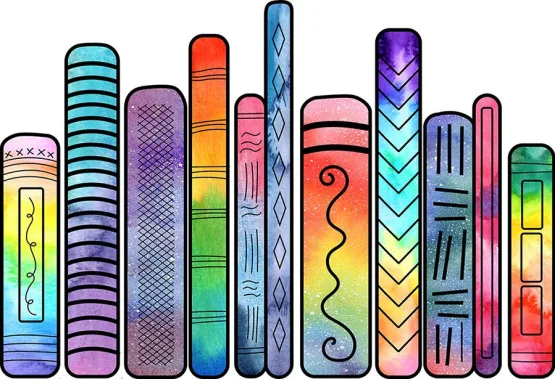

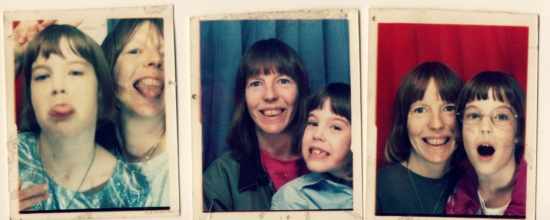
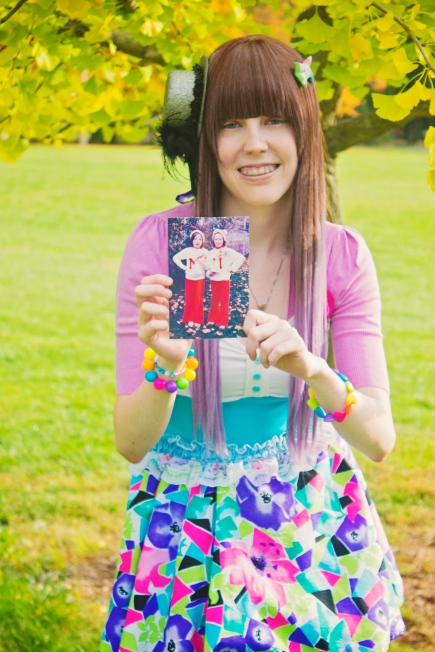
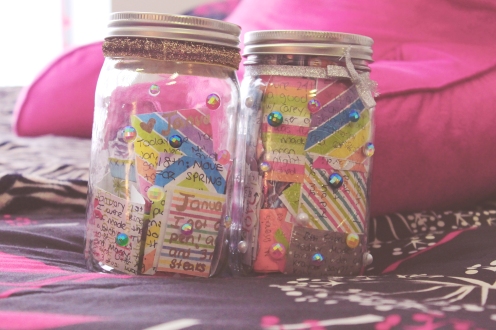
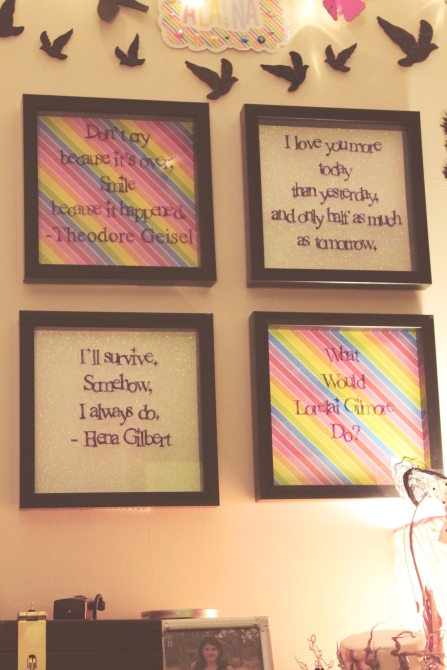

All of these really hit home for me. I also lost my mom when I was really young and every one of these was so relevant and true.
LikeLike
I’m glad my post was able to reach someone! I’ll probably be posting about it more in the future in other topics.
LikeLike
Thanks for sharing your story and yes I confirm 100% Art can change and help us. I lost my dad and my best friend but Art changed everything in a better way!
LikeLike